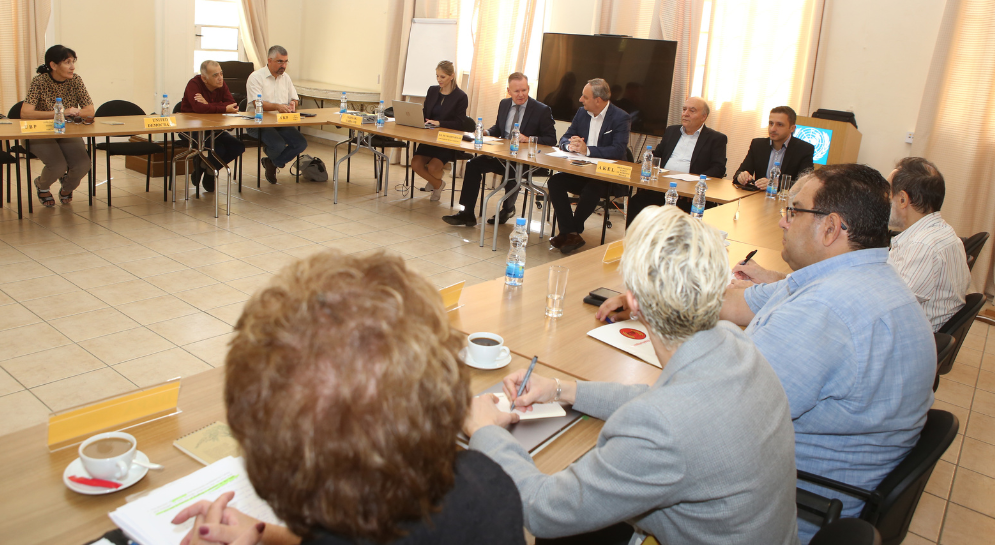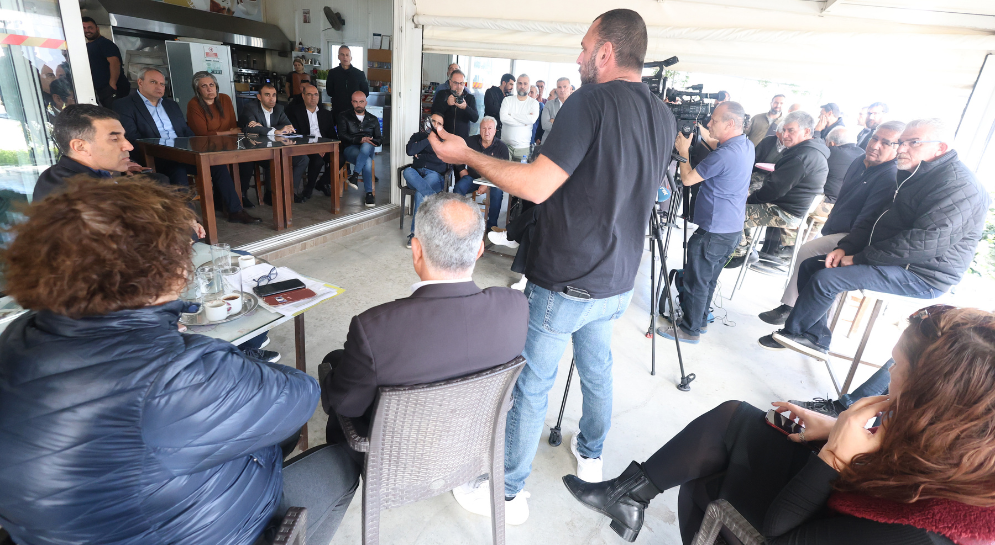
Speech by the General Secretary of the C.C. of AKEL Stefanos Stefanou at the meeting of Greek Cypriot and Turkish Cypriot political parties hosted by AKEL under the auspices of the Slovakian Embassy
Monday 31 October 2022, Ledra Palace, Nicosia
The solution of Bizonal, Bicommunal Federation as the only way forward: neither two states, nor “new ideas” undermining achieved core convergences
No discussion on the solution of the Cyprus problem is conducted in a vacuum. Just as no attempt to resolve any political problem, conflict or any other issue that hinders peace, progress and people’s prosperity is carried out in a vacuum. On the contrary, the factors that determine debates such as the present one relate to the nature of the problem and the reasons that caused it, the change in the conditions in a way that should ensure a mutual compromise among those affected, and the context that has been formulated through the long standing efforts to resolve it. Of course, in no way can this debate overlook the principles and values provided for by international law, the principles on which the EU is founded and human rights.
In a particularly difficult environment, we are called upon today as the two communities to answer a crucial question, the answer to which may determine the path that the cause of the Cyprus problem and the very future of our country and its people will take. Is federation the only way to safeguard the well-intentioned interests of all, Greek Cypriots and Turkish Cypriots? Or are there other options that can be viable, as fair and mutually acceptable as possible? Even those who are skeptical about the solution of federation cannot overlook the fact that it is the only common ground between the two communities. Anything else is rejected out of hand by one or the other community.
AKEL’s position is well-known, namely that no solution outside the agreed framework of bi-communal, bizonal federation with political equality, as defined through the relevant resolutions of the UN, can serve our goals and visions of reunification and the co-management of our common homeland. Our fierce reaction to all those who proclaim that the cycle of the solution of federation has come to an end is also very well-known because, to put it simply, this would subsequently open a vicious circle, that of partition and the suffering it will bring to all our people.
Although at different stages of the Cyprus problem, we have been confronted with approaches that were undermining the agreed basis for a solution as set out in the 1977 and 1979 High-Level Agreements, no negotiating procedure has not been based on any other form of solution other than that of Bizonal, Bicommunal Federation. Furthermore, under no circumstances whatsoever was it contested at the negotiating table that the relationship between the two communities would be based on political equality, which will represent an adaptation of the bicommunalism of the 1960 Constitution in the conditions now of a federal state, on the basis of the definition that was given by the United Nations (UN) in 1990. It is no coincidence at all that the international community, especially the United Nations, has never accepted approaches that were undermining the essence of federation.
Proposals that sought to reverse the achievement of a solution and that would reunite the people and the land, that were attempting to legitimise fait accompli that were created by interventions on the part of third parties, that did not safeguard the human rights of all on the island and that would serve as a bad precedent for the international community, were considered unacceptable. It is enough to recall the vehement reaction of successive Secretary Generals of the UN when an attempt was made in the past for the resumption of the negotiations with a prior recognition of two separate sovereign entities.
Today, when similar preconditions are preventing the resumption of the dialogue, it is worth asking ourselves first and foremost whether they serve us, the very people of this country, who want to live together and in peace in our common homeland.
The demand for the recognition of separate sovereignty so that the negotiations can resume, which refers to a separate state, cannot under any circumstances be accepted. The issue of sovereignty was discussed for decades until we reached a mutually acceptable convergence between Christofias and Talat, which addressed the legitimate concerns of both communities without leaving any ambiguities with regards the existence of two separate entities in Cyprus. Both because historically and according to international law such a thing cannot be accepted and also because through the solution we are called upon to safeguard that we will not face problems in the participation in international organisations, as the continuation of international treaties, in the tackling of a future secession or attempt to expel one community from the common state.
Unfortunately, the persistent position put forward for a two state solution and the simultaneous actions that are consolidating the partition of Cyprus on the ground, such as the illegal opening of Varosha and the general escalation of tension in the maritime area where, according to the Law of the Sea, the Republic of Cyprus legally exercises sovereign rights, do not promote the dialogue. On the contrary, the slim hopes are fading for a comprehensive, real solution of all those problems that the current status quo, which is obviously not static, is creating. Worse still, they give rise to other problems which will continue to plague future generations.
One example is quite indicative.
How will we be able to benefit equally from the discovery of natural gas, which is our common inheritance, how will we be able to exploit the natural resources of the island, how will the delimitation of maritime zones proceed in compliance with international law with Turkey too proceed if the Cyprus problem is not solved?
On all these issues, it is the convergences for a federal solution to the Cyprus problem that provide mutually acceptable solutions. In contrast, the permanent partition which unacceptable proposals such as the two state solution serve, will both perpetuate the problems and multiply them with an uncertain outcome.
Nor, of course, do the so-called “new proposals” that have from time to time crept into the public debate or are being expressed behind closed doors serve the cause of the solution. Any idea that questions convergences that have been recorded after decades of painstaking negotiation will continue to find us completely opposed. The balance that has been found on a number of core issues must be preserved for two reasons: firstly, because it represents the mutually acceptable outcome of both sides and secondly, because if issues of such importance and sensitivity are once again reopened, it’s certain that we will be led into new endless discussions. This is something that does not serve either side that is involved in the Cyprus problem.
As much as we are opposed to Mr. Tatar’s demand for the acceptance of sovereign equality as a precondition for the resumption of the negotiations, so are we also equally opposed to ideas that question the effective participation of both communities in the institutions and decisions of the central government. Our position is given that the convergences that had been agreed up to the end of the 2017 Conference on Cyprus, such as the one positive vote in the Council of Ministers with the creation of a mechanism to resolve deadlocks, or the rotating presidency with cross and weighted voting, the agreement on participation and decision-making in the secondary bodies with little that remained to arrive at a conclusion, the identical competences of the federal units, must be preserved.
In the uncertain and insecure environment that is taking shape globally and particularly in our region, the solution of the Cyprus problem takes on an urgent form. The perpetuation of the de facto partition exacerbates the problems that we are all called upon to confront every day and does not provide any guarantee of hope for the future. Our country is too small to be divided in two.
Only a federal solution to the Cyprus problem can ensure peace and prosperity as soon as possible, free us from the tutelage of third parties and ensure the full respect for the human rights of all – Greek Cypriots, Turkish Cypriots, Maronites, Armenians and Latins.




